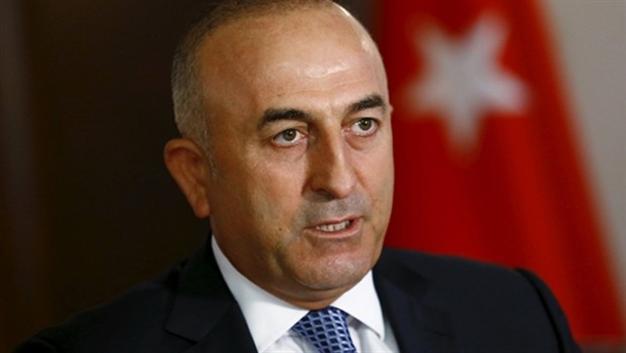US soldiers with YPG insignias unacceptable, says Turkish FM
ANKARA
 Turkish Foreign Minister Mevlüt Çavuşoğlu has strongly reacted to photos of U.S. special operations forces wearing Syrian Kurdish People’s Protection Unit (YPG) insignia on their shoulders during an assault on Syria’s Raqqa, saying it is “unacceptable.”
Turkish Foreign Minister Mevlüt Çavuşoğlu has strongly reacted to photos of U.S. special operations forces wearing Syrian Kurdish People’s Protection Unit (YPG) insignia on their shoulders during an assault on Syria’s Raqqa, saying it is “unacceptable.” “It is unacceptable that an ally country is using the YPG insignia. We reacted to it. It is impossible to accept it. This is a double standard and hypocrisy,” said Çavuşoğlu on May 27.
On the same day during a visit to the State Department, Turkish Ambassador to Washington Serdar Kılıç expressed Turkey’s irritation at the news that U.S. troops sporting YPG emblems were fighting against ISIL north of Raqqa.
As U.S. Ambassador to Ankara John Bass was not in town, Turkey’s reaction was passed on to Kılıç through a telephone conversation.
In both conversations, Turkey reiterated that it was unacceptable for the U.S. to cooperate with the Syrian Kurdish Democratic Union Party (PYD) and its armed wing, the YPG, despite the fact that Ankara emphasized to Washington the link between the PYD and the Kurdistan Workers’ Party (PKK).
Commenting on the photos, the Pentagon acknowledged that special operations forces do what they can “to blend in with the community.”
“Special operations forces, when they operate in certain areas, do what they can to blend in with the community to enhance their own protection, their own security,” said Pentagon spokesperson Peter Cook during a May 26 press briefing, adding that he would not comment on specific photos.
Agence France-Presse released photos showing armed men in uniform identified by Syrian Democratic Forces (SDF) as U.S. special operations in the northern Syrian province of Raqqa on May 25. Some of the men seen in the photos wore an YPG insignia on their shoulders.
“Special operations forces in the past have worked with partners, and in the past have conducted themselves in such a way that they might operate in an atmosphere in which they are supportive of that local force in their advice and assist role,” Cook said.
“And they might be, again, for visual purposes, blending in with the local community,” he added.
The U.S.-backed SDF, which consists of the YPG, Syrian Arabs and Syriacs, launched an offensive against ISIL stronghold Raqqa on May 24.
The YPG is the armed wing of the Kurdish Democratic Union Party (PYD), which Turkey says is a Syrian offshoot of the outlawed Kurdistan Workers’ Party (PKK), thus making both the YPG and PYD terrorist organizations.
Though designating the PKK as a terrorist organization, the U.S. does not perceive the PYD and the YPG in the same way and says they are “reliable” partners in its fight against the Islamic State of Iraq and the Levant (ISIL).
This designation difference has caused a rift between the two NATO allies, Turkey and the U.S.
Meanwhile, the U.S. May 26 denied it has provided arms to the YPG in Syria, despite the insistence of the group to the contrary.
“We are playing an advise and assist role,” U.S. State Department spokesman Mark Toner said. “But assisting is not specifically providing arms.”
Toner said, however, that there is a lot of “liberated” equipment being used on the battlefield and that it was impossible to say where from where they come.
“We just don’t have the clarity on that,” he said.
















